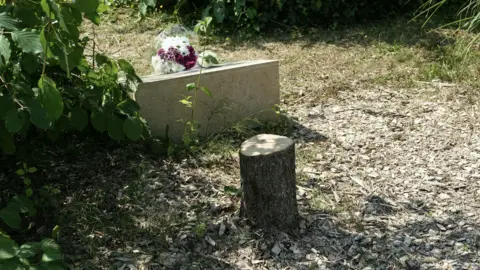In a recent disturbing incident steeped in antisemitism, French President Emmanuel Macron condemned the act of hatred following the cutting down of a memorial tree dedicated to Ilan Halimi, a young French Jew who was brutally murdered in 2006. The memorial tree, an olive tree planted fourteen years ago in Épinay-sur-Seine, was a symbol of remembrance for Halimi, who became a victim of a gang kidnapping that shocked the nation at the time due to its brutality and the motivations behind it.
Macron’s vehement response highlights the ongoing struggle against antisemitism in France. He stated, “All means are being deployed to punish this act of hatred,” reinforcing the government’s commitment to seeking justice. Paris police chief Laurent Nuñez announced that an investigation is underway, asserting that authorities would take every necessary measure to identify the individuals responsible for this reprehensible act.
Ilan Halimi’s tragic story gained notoriety in France for its violence and the disturbing motivations behind it. Held captive by a gang known as the Barbarian gang for over three weeks, Halimi suffered severe abuse before his body was discovered by a railway line, bound and burned, sending national shock waves. This brutal incident not only raised a spotlight on the issue of safety for Jewish people in France but also highlighted the antisemitic sentiments that propelled the crime, as the gang targeted Halimi specifically because he was Jewish, mistakenly epitomizing him as a wealthy individual due to his heritage.
At the trial, the leader of the gang, Youssouf Fofana, was sentenced to life imprisonment after being found guilty of kidnapping and murder, while other members of the gang received varying sentences, reflecting their level of involvement. The chilling nature of Halimi’s murder casts a long shadow over French society, a stark reminder of the work that still needs to be done to combat hatred and prejudice.
The memorial olive tree was not just a local symbol; it represented a collective memory that was shared across multiple memorials in Paris dedicated to Halimi. However, its brutal destruction resonates as a stark reminder that the fight against antisemitism is far from over. The local authorities reported the tree was found felled, starkly cut at its base and discarded in a nearby flowerbed, a visceral manifestation of hate against the Jewish community.
Macron firmly stated that “France will not forget this child of France who died because he was Jewish,” reinforcing his administration’s position against antisemitism as he promised to hold those responsible to account. He emphasized the importance of remembrance, respect, and unwavering resistance against such acts of hatred. French Prime Minister François Bayrou echoed this sentiment, asserting that “no crime can uproot memory” and that the struggle against the “deadly poison of hatred” is a primary duty for the nation.
Historically, France has seen similar acts of desecration against symbols of Jewish identity. In 2019, another tree honoring Halimi was cut down, viewed at the time as an antisemitic attack. Additionally, in 2017, a plaque commemorating Halimi was vandalized with antisemitic graffiti, highlighting a disturbing pattern of hostility toward Jewish memorials.
In conclusion, this recent incident serves not only as a grave reminder of the antisemitic undercurrents still present within society but also of the nation’s commitment to facing and combating these issues head-on. The determination of French officials to seek justice for Ilan Halimi, alongside their vows to protect and honor his memory, illustrates a collective responsibility to ensure such acts of hatred are met with resolute opposition and remembrance.












